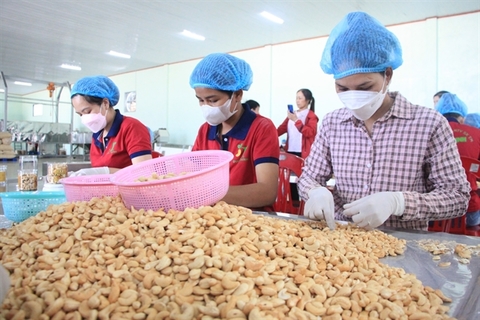
Illustrative photo. Workers pack cashew nuts. — VNA/VNS Photo
Following the release of a notice by the Việt Nam Cashew Association (Vinacas) warning cashew businesses about potential fraud concerning the export of cashew kernels to Dubai, United Arab Emirates (UAE), the Vietnamese Ministry of Industry and Trade's (MoIT) Asia-Africa Market Department has confirmed swift action.
The ministry confirmed that as soon as they received the formal letter from the Việt Nam Pepper Association (VPA) and the report from the Việt Nam Trade Office in UAE on July 21, they forwarded it to the Embassy of the UAE in Hà Nội. Their request was for the embassy to alert the appropriate authorities to investigate and take appropriate action in relation to the potential fraud case.
The report from the Việt Nam Trade Office in UAE also states that the trade office had received written reports from a number of Vietnamese businesses with the same content, accusing an importer in the UAE and a collection bank in Dubai, tricking them into signing contracts to buy cinnamon, pepper and cashew.
Immediately after receiving the written reports from businesses, the Trade Office sent a note to the UAE Ministry of Foreign Affairs, Dubai Police, Central Bank of the UAE and a number of related banks and shipping lines.
In addition, the trade office has worked with a number of units such as relevant bank branches in Dubai; Dubai police and filed a report on the incident; shipping lines and authorities of the Jebel Ali port.
According to the Asia-Africa Market Department, fraud in the Middle East market has appeared more than before, mainly concentrated in small-scale trading companies.
Notably, the most common form of fraud today is that when a foreign business signs a purchase contract with a Vietnamese company, it often requires telegraphic transfer or issuing a check to the seller. These are the two riskiest forms.
In order to avoid unfortunate losses, MoIT recommends that Vietnamese enterprises, when dealing with foreign enterprises, must be cautious and carefully negotiate payment terms to ensure safety.
It also noted that the seller's banks, when transferring documents to the buyer's bank, must ensure safety, avoiding issues because the delivery of documents and receipt of documents do not have a signature.
Accordingly, it leads to the bank security staff handing the documents to the buyer to receive the goods, but the buyer does not pay the bank to pay the seller's bank. — VNS